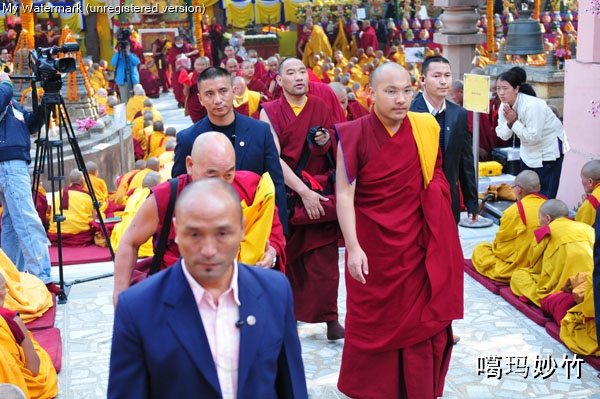法王新闻 | 2010年12月
『第28屆噶舉祈願』第6天:开示《政教願文》
『28th Kagyu Monlam』A Short Speech On Politics And Religion
བསྟན་སྲིད་ཞབས་རིམ་གསུང་ཆོས།།

時間:2010年12月20日 1:30-3:00pm 20th Dec., 2010
地點:印度 菩提迦耶 正覺大塔 Mahabodhi Stupa, Bodhigaya, India
藏譯中:堪布丹傑、乘宗法師
攝影:噶瑪善治、噶瑪諾布、班瑪歐色多傑、廖國明、廖佳基
報導:黃靖雅
■第三座法 SESSION THREE
下午1:30,法王蒞臨,陞法座。
法王開示:
Providing context for the practice session, His Holiness first gave a talk on Dharma and politics, or religious and secular affairs. The Tibetan term ‘si’(སྲིད་) that in this context denotes politics, more generally describes a way of bringing about short- and long-term benefit to a society or country. His Holiness noted that the Tibetan term ‘si’(སྲིད་) also means length. In its wider sense, this term ‘si’could also apply to the Dharma, because the Dharma aims to bring about long-term benefit to society.
所謂的「教政」(བསྟན་སྲིད་),其實有很大的意義在裡面。「教」(བསྟན)指的是佛教,也就是源自於釋迦牟尼佛所宣說的佛法,所以「教」指的就是佛教。「政」(སྲིད་),就是讓這世間的社會大眾能無誤地得到善妙的好處、利益。
如果從「利眾」這樣的一個角度去理解,「教」跟「政」的意思可說是相通的。因為「政」的意義如果是為了讓人民、讓整個世界過得更快樂的話,那麼就可以說它是教法的一種延伸作用。教政兩者都能夠產生妙善的果實、成為利樂眾生的道路,
During the reign of the three Dharma kings of the Tibetan imperial period, the Tibetan people were ruled according to the Dharma. Later generations too prospered due to the prior rule of the Dharma kings, who sought to apply principles of Dharma in their governance. Citing the well-known line of verse stating that all phenomena are impermanent, His Holiness noted that times have of course changed greatly since then. The relation between religion and politics itself has undergone many changes over the years, and there have been periods of growth and contraction. Within Tibet, there was great fluctuation, as was the case also in Tibet’s relations with neighboring countries.
像過去西藏歷代的國王,也都是佛教的大護法,對於佛法的弘揚,貢獻非常大的力量。那段時光,是「政教」上一個非常善妙的時節。為了讓現在所有藏民族的後代能夠更加安樂,我們要念誦〈教政願文〉。
過去的西藏民族對於佛法的關係,無比的親密。但是,世界上沒有哪一個民族,能夠這麼多個時代以來一直非常平安,沒有遇到任何麻煩事,這是不可能的。因為遇到障礙,也是法性的一種顯現。我們這個時代的人,應該發願去承擔、生起責任感,繼續護持這麼一個優良傳承的殊勝法教。我們要經常憶念藏民族的祖先傳承下來、深具啟發性的這些優良傳統。
In today’s more difficult times, it is incumbent upon us as Dharma practitioners to reflect on what course of action would be beneficial and consistent with the Dharma, and what would not. When we analyze historical situations when there was great decline, we ought to consider the role that abuse of power played in bringing about those difficult times. In the past several decades, Tibetans have faced unprecedented sufferings and hardship, and hundreds of thousands of Tibetans have been forced to leave their homeland. Today, Tibetan culture and the Tibetan way of life are at high risk of disappearing forever.
這個世紀以來,雪域內外都生起了很多違緣與障礙,藏民族經歷了過去不曾經歷的鉅大艱辛。很多離開藏地的藏民,都生活在印度,這個善待我們的地方。現在,藏地佛法的力量,還有以政治力護持佛法的傳統,可說越來越衰敗了。
Nevertheless, Tibetans are extremely fortunate in that they continue to be led by His Holiness the Dalai Lama, and Tibetans continue to place their trust and hopes in him as their leader. Many other Tibetans—and indeed people of many countries—are working for peace and harmony between Tibet and China, the Gyalwang Karmapa noted, and have not been overwhelmed by purely political motivations. His Holiness the Dalai Lama in particular is not pursuing any partisan aims, nor does he merely promote Tibetan interests. Rather, he is working for the well-being of Chinese as well as Tibetans, so that Chinese and Tibetans can live together for many generations in mutual respect, joined as one large family.
但是,在雪域怙主達賴喇嘛的領導、開示下,所有藏民族對未來還是懷著非常大的信心,我們也能夠看得到未來的希望。我們期望藉由這樣一個迴向,在達賴喇嘛的繼續領導下,藏民族未來能更加平安,不再經驗這麼多違緣和障礙。特別是達賴喇嘛並非只是關心西藏人民的快樂和平安,他的心關懷著整個世界全人類的安樂和福祉,他總是為了全人類的幸福安樂在不斷努力、不斷精進著。
It is important not to overlook the long history that links China and Tibet. Whereas Tibetans looked up to Indians as Dharma teachers and adopted appropriate relationships with Indians on those terms, by contrast Tibetans saw Chinese as cousins or brothers. Thus whether or not we can establish relations of mutual respect and harmony between Chinese and Tibetans depends on our own cultivation of love and compassion.
千百年來,漢人和藏人有著非常密切的關係。在法教的傳承上,也經常互為師徒。漢人可說是西藏人民的親人,一直有一種親密的朋友關係。這是千百年來的真實歷史,是我們沒法抹滅的。所以,希望在未來的日子裡,漢藏民族之間更能互相關愛、互相慈悲。如果從佛法的名詞上去講呢,就是希望懷著更多的悲心,互相關愛,將對方放在心裡,能夠互相利益、彼此幫助。
The Gyalwang Karmapa noted that Tibetans in Tibet harbor great hopes and make great aspirations that His Holiness the Dalai Lama and other great masters will one day be able to return to Tibet and re-establish a time of peace and harmony.
為了這樣的理由,不管是現在還住在西藏雪域的人,或者是住在印度、海外的藏民,都祈願以達賴喇嘛為主的許多西藏上師,包括目前住在印度的許多西藏傳承大師,他們不間斷地傳承著西藏的法教,祈願他們都能長壽住世。
Stressing the importance of making requests and invoking the activity of Chenrezig, as well as Padmasambhava and the emanations of Chenrezig, White and Green Tara, the Gyalwang Karmapa cited a verse about Chenrezig’s commitment to care for Tibet:
To the north of Bodhgaya in the east,
You have the land of the kingdom of Tibet.
You have high peaks as pillars supporting the sky,
You have white snow forming crystal stupas.
You have summers beautified with turquoise blooms.
O, Chenrezig, Protector of this land of snow,
In this place you have your disciples.
At the same time, His Holiness stressed that the crucial factor determining whether we have peace and harmony is our mind. If we succumb to negative tendencies, and just criticize others and feel annoyed with one another, it will be very difficult to fix the situation, he cautioned.
我們也祈願跟我們是法友關係的漢民族、漢地華人們,能夠越來越快樂,越來越幸福。希望全世界、全人類能夠更加幸福、安樂,用這樣的一種善良的動機、發心,就能利益一切有情生命,這是非常重要的。就像噶當派祖師所說,「跟我們自己同樣生活在這個大地上的人民,都是受著觀音菩薩大悲心的攝持。」我們要像這樣用悲心去做祈願。
過去,蓮師到了西藏,興盛了西藏的佛法,對西藏有非常大的恩德。所以,我們要祈請蓮師;也要祈請度母,因為她對西藏也有非常多的加持。總而言之,也就是希望各民族的人們能夠有更多的慈心、悲心,不再互相傷害。
His Holiness also observed that in this holy place of Bodhgaya, we may only appear to be making aspirations for happiness, but in fact we are preparing ourselves to put these aspirations into action. Thus it is important to begin with aspirations, the Gyalwang Karmapa concluded.
Spiritual teachers as well as sponsors and government officials form the key conditions that allow the Dharma to flourish. For that reason, the Gyalwang Karmapa asked all those assembled to make sincere prayers for the long life of His Holiness the Dalai Lama, as well as all masters of all traditions. In India, Bhutan and throughout the Himalayas where people practice Tibetan Buddhism, these masters are the only place they can turn for guidance. Thus it was important to offer strong aspiration for their wishes to be fulfilled and their activity flourish. We should put on the strong armor of courage, His Holiness said, and make even stronger aspirations that all people be free of the sort of terrible difficulties and problems they have faced in this life and that in their next life they connect swiftly with Chenrezig.
現在我們大家在菩提迦耶金剛座,在教主座前,發著同樣的祈願,希望大家在心中用這樣廣大清淨的動機來作祈願。
特別是為了佛教,為了一切眾生,能夠有更多興盛安樂的順緣,也為了護持佛教的施主和信眾,祈請、祈願達賴喇嘛尊者能夠健康長壽住世,繼續利益佛教,繼續引導一切眾生。
同時也要祈請世界上所有住持正法的善知識,不只是西藏的傳承上師,包括漢傳或者其他佛教傳承、還有喜瑪拉雅地區住持正法的上師們,他們都是眾生的怙主、眾生的依靠,也祈願他們所有弘法利生的心願都能夠圓滿成就。還有為了西藏教政,我們不要著眼於現在的名聞利養,而是真正能夠發起一種勇氣,能夠去做一個祈願,讓違緣、障礙能夠消失,為此,我們要特別祈請觀世音菩薩。
Don’t just chant the words, His Holiness urged the assembly. Chant with your hearts, he said. Even if no feeling comes, at least reflect on the meaning as you say the words. This is important, he said. Our chanting should not be left on the level of mere words.
接下來我們要念誦一些祈請文,並不是嘴巴上念一念,而是從內心深處生起一種感覺,儘量生起一種清淨的動機;否則只是嘴巴上念念,但是心中沒有什麼感覺,也沒有什麼好動機,這樣並不是如法的行徑。就像你對一隻鸚鵡說:「嗡嘛呢唄美吽」牠可能也會嘴巴上跟著你念念,但是有口無心,因為心中它並沒有清淨的動機,所以沒有太大利益。
我們大家都在學習著禪定,這個禪定的重點呢,就是你心中要保持善的動機。如果我們總是坐得舒舒服服的,隨便修一修,過一天算一天,將來當我們真實遇到身心的困難時,是沒有辦法真正修行的。那時你怎麼去呼喊蓮花生大士也是沒有用的。所以呢,就像經典裡提到的,當我們的身心經驗到一些苦樂時,不要只想到自己,而要去想著一切眾生也跟我一樣,有著這樣的苦樂感受。所以,如果我們擁有修行人的名號,就應該這樣修行,而不是嘴巴上隨便念念。
The recitation of prayers began with the seven-line supplication to Guru Rinpoche, which was repeated 21 times, followed by praises to the 21 Taras three times. Next were prayers for the flourishing of the Dharma of all traditions, and then long-life prayers for His Holiness the Dalai Lama, Sakya Trizin, Kyabje Trulshik Rinpoche and the various Kagyu masters.
Just as His Holiness had exhorted, as thousands of voices uttered fervent aspirations for the well-being of Tibet and its spiritual leaders, thousands of hearts were chanting too.
接下來呢,我們要念誦24遍〈蓮師七句祈請文〉。然後要念誦的是觀音菩薩的化身綠度母的祈請文,會念三遍,也祈請綠度母能夠加持一切眾生都能夠從恐懼當中解脫。
法王領眾念誦〈救度佛母二十一種禮讚經〉(P324)
法王帶領大眾念誦:
〈政教願文〉(另本,《大祈願法會課誦本》暨《增訂本》無)
